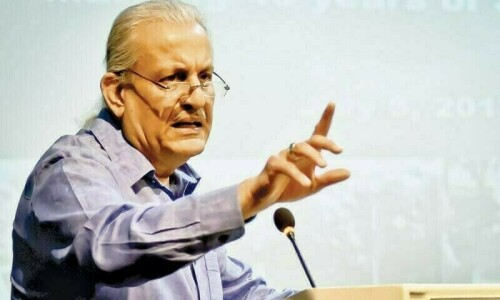KARACHI: The National Academy of Performing Arts’ (Napa) tribute to playwright Kamal Ahmed Rizvi on Friday evening should be acknowledged because it aimed to relive his creative legacy. Napa’s version of his play Khoya Hua Aadmi, directed by Khalid Ahmed, in the in-house theatre was an attempt that can be examined by raising two questions. Does the play capture the narrative nuances that the late Mr Rizvi’s dramas were known for? Does it capture the psychological battles that his characters are constantly engaged in? The answers to both questions are a little difficult to give. But let’s first, briefly, go through the theme of the play.
Danish (Fawad Khan) is married to Bano (Aiman Tariq). The couple lives in a flat. Danish has a sensitive disposition. When the first scene commences, Danish is seen a little unhinged. He can’t sleep. Bano inquires about it, he hums and haws. Bano has been with him for years, she knows that he is bottling something up. She tries to get him to tell her what’s gone wrong. Danish’s ego doesn’t allow him to divulge the truth to her. After an exchange of intense dialogue it turns out that his position in the office where he works is getting weak. The company has incurred losses which can result in downsizing. The next scene vindicates his fears. His employers have been cruel to him. They have not been considerate enough towards Danish despite the fact that he had given it more than 20 years of his lifetime.
Bano consoles her husband. He gets irritable by the minute, so much so that he even picks up a fight with the neighbours. Bano somehow salvages the situation. To straighten things out, she herself does a job. Later on in the story, Danish’s brother Arif (Owais Mangalwalla) and three sisters Azra, Zubeida and Abida (Zarqa Naz, Asia Alam and Shumaila Taj) arrive to see their brother. This provides an insight into the family they were brought up in. The siblings are unlike Danish which the audience gets to know as they discuss his nervous breakdown.
Khoya Hua Aadmi is a drama that basically lays bare the insecurities of a man in a competitive world. Along with it come the social pressures which impinge on his psyche. But he cannot see the world that he has built around himself crumble. Therefore he struggles to save it from getting razed to the ground. Consequently, paranoia sets in and the plot moves from the emotional to the high-strung.
Mr Rizvi had read, and was fond of, quite a few playwrights, including Ibsen. The issue of tenuous human relationships against the backdrop of societal constraints often features in his creative pursuits. Khalid Ahmed, the director of the play, seems to understand that well. His control over the literary nuances and psychological battles that the protagonists confront is plausible.
Fawad Khan and Aiman Tariq have now become far too experienced as theatre performers to make rookie mistakes. They know how to grab the audience’s attention. They were able to do that on Friday (let’s ignore a few fumbles). One doesn’t know if they got to see the tele theatre in which Kamal Ahmed Rizvi and the incomparable Khalida Riyasat played the two principal characters. The emotional range that the two late actors showed in that television version was quite special. This is not to suggest that Fawad and Aiman did not do that. They were very good. It’s just that sensitivity of a character does not always require the help of poignant dialogue.
Khoya Hua Aadmi will run until March 13.
Published in Dawn, March 5th, 2016














































Dear visitor, the comments section is undergoing an overhaul and will return soon.